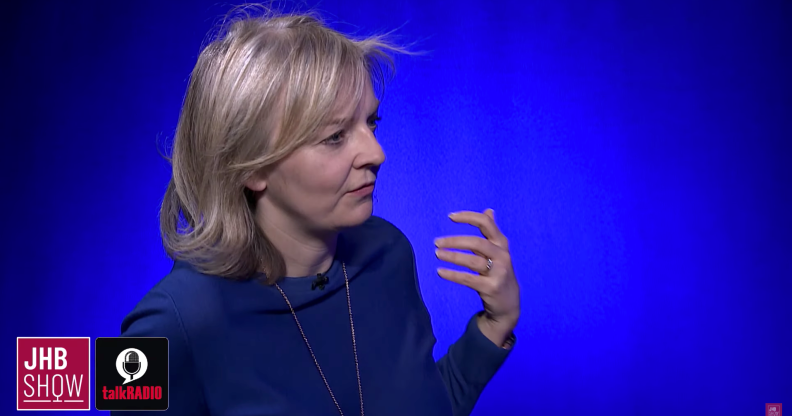Equalities minister Liz Truss says no one wants to be hired as a ‘token gay’, wants to rebrand department as Ministry of Freedom

Liz Truss speaking on the JHB show (YouTube)
Liz Truss has revealed how she will be approaching her new role as Minister for Women and Equalities, saying that she will be moving away from the “identity politics” of the left.
Truss took on the role last month, replacing Amber Rudd who resigned in protest at Boris Johnson’s handling of Brexit. Speaking to talkRADIO’s Julia Hartley-Brewer, Truss said she saw an opportunity to “do things differently”.
“I think there’s been too much identity politics in Britain. There’s been too much of, you think this thing because you’re a woman, or you’re part of this group and we want to do X, Y or Z,” she said.
“I would much rather see individuals being allowed to succeed regardless of their gender, their sexuality, their race, and that’s the way I’m approaching this brief.
“We’ve got to get away from this idea that somebody should be appointed to a job because of – no one wants to be the token woman, you don’t want to feel like you’ve been appointed to a job because you’ve got boobs. Likewise, no one wants to be the token gay person. I think that we need to think differently about this.”
Truss indicated that she would be moving away from “identity politics” and instead “reassert[ing] the value of individual talent and character above the particular type of group you might happen to be a member of”.
In light of this, Hartley-Brewer asked if she felt the Ministry of Women and Equalities was the right name for the role.
Liz Truss replied: “It should be the department freeing people to do what they want to do with their lives.
“So it should be the Ministry for Freedom, being able to make those own choices, not being restricted because they’re a woman or gay or from a particular ethnic minority.”
Truss, who has previously backed Mumsnet in an argument over free speech, also claimed that Britain’s political debate was being stifled by demands that MPs restrict the language they use.
“I don’t support abuse, incitement to violence but we’ve got to be careful not to be too censorious of people having a genuine political debate,” she said.
“I think one of the frustrations of the British public is that there’s a certain amount of censoring of what it’s acceptable to say and that is a big problem.”

